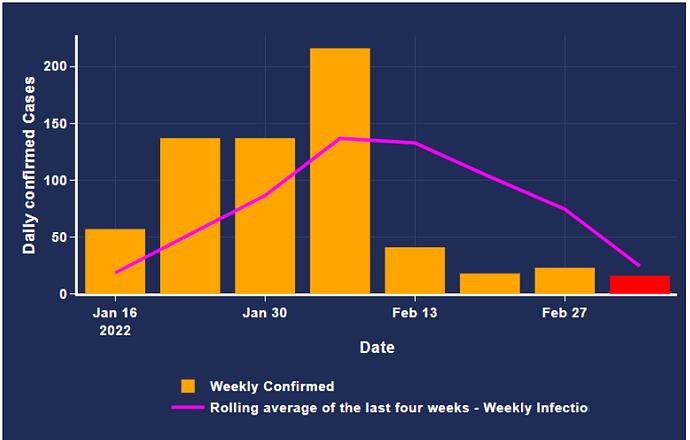How to put a red box and a label in the legend with a label prediction since for now it only showed the weekly confirmed
THIS IS THE CODE
weekly_infection = db.selecting_infection()
weekly_infection["dateinfection"] = pd.to_datetime(weekly_infection["dateinfection"])
weekly_infection.set_index("dateinfection", inplace=True)
raw_data_infection = weekly_infection["infection"].resample("W").sum()
raw_data_weekly_infection = raw_data_infection.reset_index()
raw_data_weekly_infection = raw_data_weekly_infection.rename(
columns={"dateinfection": "Date", "infection":"Infection"}
)
covid_data_1 = raw_data_weekly_infection
date_new_list = datetime_list("Infection", covid_data_1)
temporary_dictionary = {"Date": date_new_list}
dates_df = pd.DataFrame(temporary_dictionary)
new_df = covid_data_1.merge(dates_df, how="right", on="Date")
new_df["Date"] = new_df["Date"].apply(
lambda x: pd.to_datetime(str(x).split(" ")[0])
)
training_percentage = 0.50
validation_percentage = 0.25
length_dataframe = len(new_df)
training_data_percentage = round(int(length_dataframe * training_percentage))
validation_data_percentage = round(int(length_dataframe * validation_percentage))
validation_size = training_data_percentage + validation_data_percentage
training_df = new_df[0:training_data_percentage]
validation_df = new_df[training_data_percentage:validation_size]
testing_df = new_df[validation_size:]
length_testing = len(testing_df)
training_array = np.array(training_df["Infection"])
validation_array = np.array(validation_df["Infection"])
testing_array = np.array(testing_df["Infection"])
training_array = training_array.reshape(training_data_percentage, 1)
validation_array = validation_array.reshape(validation_data_percentage, 1)
testing_array = testing_array.reshape(length_testing, 1)
history = [element for element in training_array]
predictions = list()
bias = 2.0036779999999936
for index in range(len(testing_array)):
arima_model_ = SARIMAX(
history,
order=(1, 0, 0),
seasonal_order=(0, 0, 0, 0),
enforce_stationarity=False,
enforce_invertibility=False,
)
fitted_arima_ = arima_model_.fit(trend="nc", disp=0)
predicted_value = fitted_arima_.forecast()[0]
predictions.append(predicted_value + bias)
history.append(testing_array[index])
latest_date = testing_df["Date"].iloc[-1]
ending_date_parse = str(latest_date).split(" ")[0]
testing_start_date = testing_df["Date"].iloc[0]
start_date_parse = str(testing_start_date).split(" ")[0]
testing_date_list = (
pd.date_range(start=start_date_parse, end=ending_date_parse, freq="W-SUN")
.to_pydatetime()
.tolist()
)
testing_list = testing_array
temporary_dictionary = {"Date": testing_date_list}
testing_set = pd.DataFrame(temporary_dictionary)
testing_set["Infection"] = testing_list
testing_set.set_index("Date", inplace=True)
testing_set = testing_set.reset_index()
training_df = pd.concat([training_df, testing_set])
training_infection = (
training_df.groupby(["Date"])[["Infection"]].sum().reset_index()
)
training_infection.set_index("Date", inplace=True)
model = SARIMAX(
training_infection["Infection"].astype(float),
order=(1, 0, 0),
seasonal_order=(0, 0, 0, 0),
)
model_fit = model.fit()
pred_date = [
training_infection.index[-1] + DateOffset(weeks=x) for x in range(1, 2)
]
pred_date = pd.DataFrame(index=pred_date[0:], columns=training_infection.columns)
pred_date = pred_date.reset_index()
pred_date = pred_date.rename(columns={"index": "Date"})
training_infection = training_infection.reset_index()
training_infection = pd.concat([training_infection, pred_date])
start_index = len(training_infection["Infection"]) - 1
end_index = len(training_infection["Infection"]) - 1
prediction = model_fit.predict(start=start_index, end=end_index)
prediction = prediction.reset_index()
prediction = prediction.rename(columns={0: "Infection"})
infection_num = int(prediction["Infection"].iloc[-1:][0])
training_infection["Infection"].iloc[-1:] = infection_num
training_infection.set_index("Date", inplace=True)
prediction_infection = training_infection.iloc[-1:]
prediction_infection = prediction_infection.reset_index()
covid_data_1 = pd.concat([covid_data_1, prediction_infection])
covid_data_1["Rolling Average"] = covid_data_1["Infection"].rolling(window=4).mean()
weekly_date = covid_data_1["Date"].tail(8)
number_infected = covid_data_1["Infection"].tail(8)
rolling_average = covid_data_1["Rolling Average"].tail(8)
frame = {
"Barangay": zones_barangay,
"Date": weekly_date,
"Infection": number_infected,
"Rolling Average": rolling_average,
}
results = pd.DataFrame(frame)
colors = [
"orange",
"orange",
"orange",
"orange",
"orange",
"orange",
"orange",
"red",
]
return {
"data": [
go.Bar(
x=weekly_date,
y=number_infected,
name="Weekly Confirmed",
marker=dict(color=colors),
hoverinfo="text",
hovertext="<b>Date</b>: "
+ results[results["Barangay"] == zones_barangay]["Date"].astype(str)
+ "<br>"
+ "<b>Weekly Confirmed</b>: "
+ results[results["Barangay"] == zones_barangay]["Infection"].astype(
str
),
),
go.Scatter(
x=results[results["Barangay"] == zones_barangay]["Date"],
y=results[results["Barangay"] == zones_barangay]["Rolling Average"],
mode="lines",
name="Rolling average of the last four weeks - Weekly Infection Cases",
line=dict(width=3, color="#FF00FF"),
hoverinfo="text",
hovertext="<b>Date</b>: "
+ results[results["Barangay"] == zones_barangay]["Date"].astype(str)
+ "<br>"
+ "<b>Rolling Ave. (last 4 weeks)</b>: "
+ results[results["Barangay"] == zones_barangay][
"Rolling Average"
].astype(str)
+ "<br>"
# marker=dict(
# color='green'),
),
],
"layout": go.Layout(
plot_bgcolor="#1f2c56",
paper_bgcolor="#1f2c56",
title={
"text": "Confirmed Cases In : " + "Barangay Carmen",
"y": 0.93,
"x": 0.5,
"xanchor": "center",
"yanchor": "top",
},
titlefont={"color": "white", "size": 20},
hovermode="x",
margin=dict(r=0),
xaxis=dict(
title="<b>Date</b>",
color="white",
showline=True,
showgrid=True,
showticklabels=True,
linecolor="white",
linewidth=2,
ticks="outside",
tickfont=dict(family="Arial", size=12, color="white"),
),
yaxis=dict(
title="<b>Daily confirmed Cases</b>",
color="white",
showline=True,
showgrid=True,
showticklabels=True,
linecolor="white",
linewidth=2,
ticks="outside",
tickfont=dict(family="Arial", size=12, color="white"),
),
legend={
"orientation": "v",
"bgcolor": "#1f2c56",
"xanchor": "center",
"x": 0.5,
"y": -0.5,
},
font=dict(family="sans-serif", size=12, color="white"),
),
}Do you want to be able to toggle the red bar as visible/invisible, or just have the legend entry there as a display?
Probably the simplest approach is to create two bar traces, one for the orange bars and the other with the red bar, and use barmode="overlay". Plotly draw one legend item per trace, therefore you would need two traces to accomplish what you want.
can you make an simple example on what you stated above because i am not really familliar on using traces
i just want a legend entry as a display
